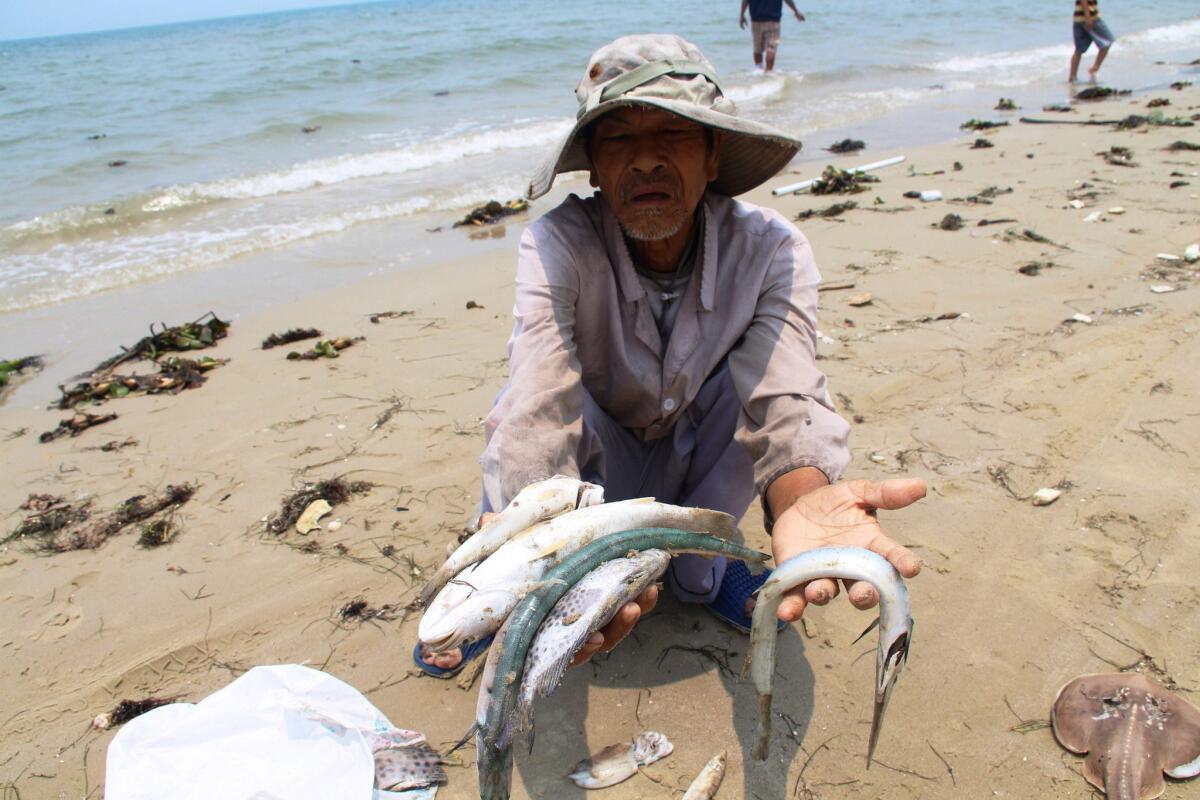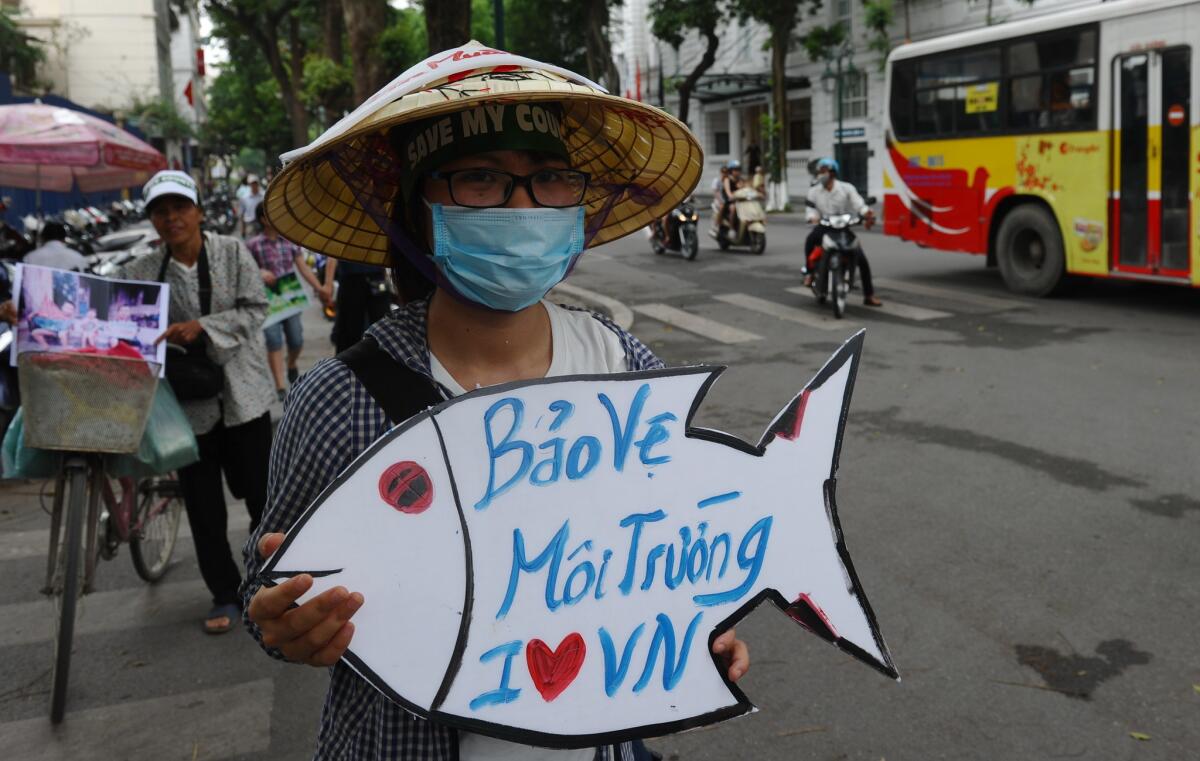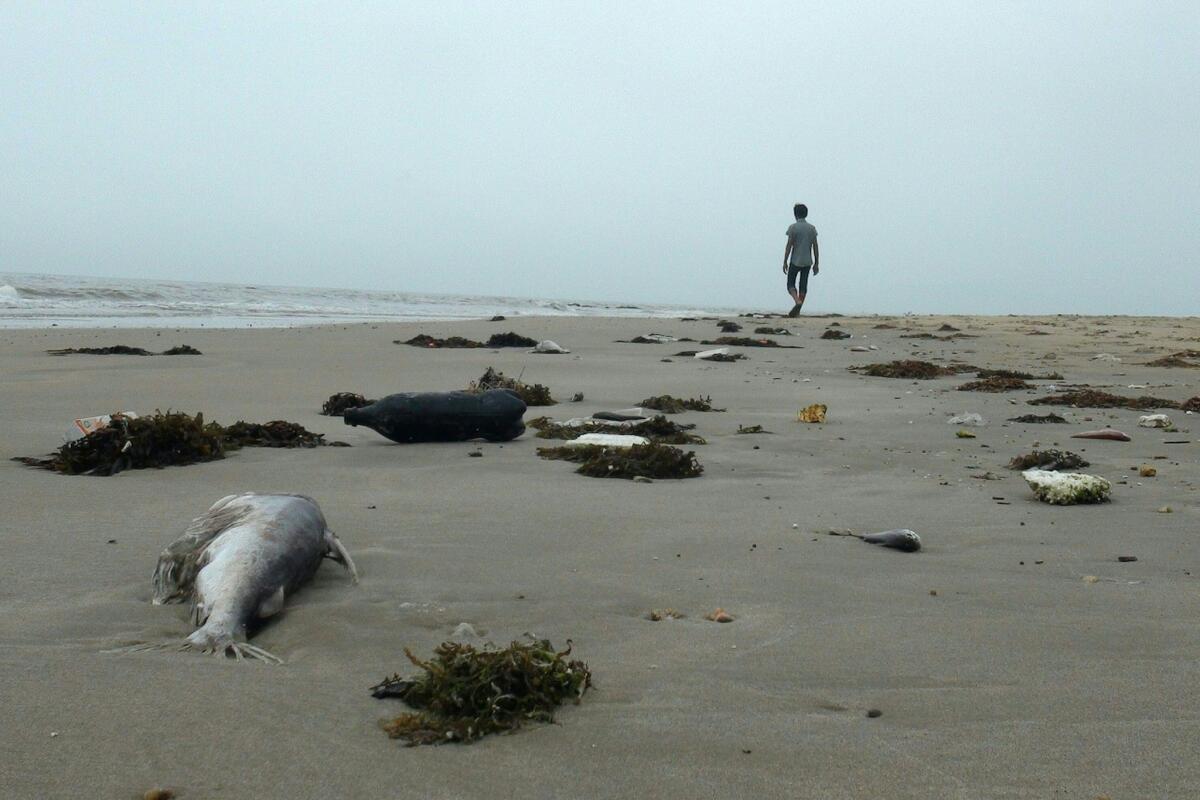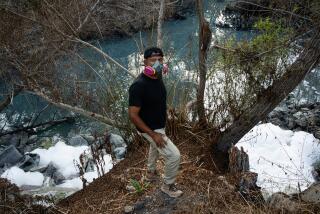Millions of dead fish on Vietnam’s shores raise industrial pollution fears

A villager shows dead sea fish he collected on a beach in Phu Loc district, in the central province of Thua Thien Hue on April 21, 2016.
- Share via
reporting from HANOI — The dead started washing up in April: miles and miles of fish, countless clams, the occasional whale. Government researchers eventually concluded that “toxic elements” were responsible for the die-off, which Vietnamese officials described as “unprecedented.”
Now people are wondering whether the seabirds dying along Vietnam’s central coast are also victims of industrial pollution.
Fears that tainted fish collected off the beaches are entering this fast-developing nation’s food supply have inspired outrage on social media and a wave of rare public demonstrations, putting pressure on a government that is accused of failing to protect public health in its push for industrial growth. Authorities have acknowledged a slow response as public scrutiny focuses on a massive Taiwanese-owned steel plant accused of pumping untreated wastewater into the sea.
“My family has decided not to buy sea fish at this time,” said Le Ngoc Bich, a clothing vendor in a traditional open-air market in Ho Chi Minh City. “Fish vendors are the ones who suffer. Everyone is anxious. We don’t know what is safe to eat.”

Vietnamese protesters demonstrate against Taiwanese conglomerate Formosa during a rally in downtown Hanoi on May 1, 2016.
Thousands of Vietnamese have signed a petition calling for President Obama to raise their concerns during his long-anticipated visit to Vietnam, expected this month. The environmental calamity, observers say, could also complicate the Obama administration’s efforts to win final congressional approval for the Trans-Pacific Partnership, or TPP, a 12-nation trade pact that is touted in Vietnam as an economic boon.
“This is a test for the government to get to the bottom of this and take appropriate action,” said attorney Fred Burke, Vietnam managing partner of the international firm Baker & McKenzie. He is also chairman of the TPP Committee of the Hanoi Chapter of the American Chamber of Commerce.
Vietnam, known as a leading exporter of rice and coffee, attracted $14.5 billion in direct foreign investments in 2015, continuing a trend that is credited with helping lift the country of 90 million people to “middle-income” status as measured by the World Bank. The steel plant suspected of releasing contaminants, owned by Taiwan’s Formosa Plastics Group, represents a $10-billion investment.
The government, I think, doesn’t care very much so we have to do something.
— Vietnamese protester Vu Quan
Vietnam’s citizenry and foreign investors alike, Burke said, should hope for strong government action against corporate wrongdoers who fail to comply with international environmental standards and laws. “If the government is not stringent on this, it tarnishes all foreign investors by association,” Burke said. A governmental failure to enforce environmental laws could give Vietnam the reputation of “a bad actor in foreign trade” and provide another argument for congressional opponents of the TPP.
The die-off was first noticed on April 6 as thousands, and later millions, of fish washed ashore along a 125-mile stretch of coastline in north-central Vietnam, including some popular beaches that ordinarily attract Vietnamese tourists. Witness accounts described how many people collected large numbers of dead fish and placed them in refrigerated compartments, presumably to sell. Over ensuing days, the Vietnamese military was ordered to help clean up the beach and bury the dead fish.

This picture taken on April 20, 2016 shows a man walking among dead fish lying on a beach in Quang Trach district in Vietnam’s central coastal province of Quang Binh.
Vietnam’s communist leadership acknowledged fault in its response, including a public apology from new Environment Minister Tran Hong Ha. “The initial handling was passive,” the government said in a statement last week, and described environmental monitoring as “untimely, inaccurate and infrequent.”
In addition to penalties imposed by the government, Burke said, wrongdoers would face civil suits from fishermen and others whose businesses have been devastated by the die off.
But many Vietnamese have complained that authorities have been slow to follow up on allegations that Formosa’s steel plant poured untreated wastewater into the ocean.
Authorities announced that scientists from the U.S., Germany and Israel are joining in efforts to analyze wastewater from all factories in north-central Ha Tinh province. Environmental consultant Bui Minh Lanh, who has worked with dioxin and wastewaters, suggested that the chemical sleuthing should have been completed within a week — and delays will make it harder to trace the original source.
Formosa has handled the controversy clumsily. While emphasizing there was no proof of its responsibility, a company public relations official also suggested that Vietnam may have to accept environmental trade-offs for industrial growth — perhaps a choice between steel or fish. That prompted a social media backlash and the hashtag #Ichoosefish.
Formosa management soon apologized for the comment and said the official who made the statement would be punished.
In a statement on April 26, Formosa said it was “deeply surprised and sorry” about the fish deaths. Formosa said its $10-billion investment in the steel factory included $45 million for a wastewater treatment system.
Formosa’s reaction fueled public demonstrations from Hanoi to Ho Chi Minh City — rare in a communist-run country where protesters who lack permits are often jailed. On Sunday, hundreds of Vietnamese gathered at the landmark Hanoi Opera House holding protest signs. Security forces elected to watch as protesters later marched for three hours around nearby Hoan Kiem Lake.
Protester Vu Quan told a wire service that he believed the authorities were complicit in a coverup. “The government, I think, doesn’t care very much so we have to do something.”
Some Vietnamese are already stockpiling fish sauce, a culinary staple. “My concern is that fish from contaminated areas will be used as raw materials,” said Tran Thi Dan, owner of a small fish sauce business. “It will cause a huge impact on my business because people are afraid of poisoning.”
“I’d love to know the reasons of the mass fish death,” she added. “Perhaps the results have not been published due to political reasons.”
Harris is a special correspondent.
MORE FROM WORLD
At a North Korean nursery school, tots get an early education in weaponry
North Korean capital in throes of ‘70-Day Speed Battle’ to prepare for political confab
In the Philippines, ‘a government with heart’ versus the rule of the fist
More to Read
Sign up for Essential California
The most important California stories and recommendations in your inbox every morning.
You may occasionally receive promotional content from the Los Angeles Times.










